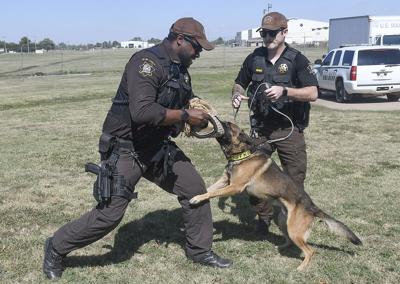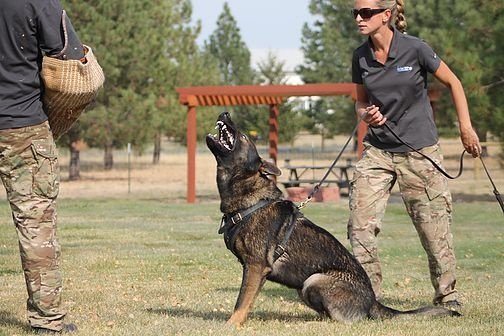How long does it take to train a German Shepherd for police work? Training a German Shepherd for police work involves several stages, including obedience, socialization, agility, scent detection, and the Police Dog Certification Test. Most dogs complete their training in 4 to 6 months.
Introduction to German Shepherds in Police Work
German Shepherds have for some time been perceived as perhaps of the most flexible and shrewd variety, making them important resources in police work. Their normal defensive impulses, joined with their sharp feeling of smell and high teaching ability, make them ideal contenders for different policing. Whether it’s following suspects, recognizing medications or explosives, or giving help with search and salvage tasks, German Shepherds reliably demonstrate their value in the field.
Understanding the Training Process
Basic Training
Fundamental preparation for German Shepherds bound for police work starts at an early age, regularly around 8 to 12 weeks old. During this stage, accentuation is put on socialization and dutifulness preparing. The little dog learns fundamental orders, for example, sit, remain, heel, and come, establishing the groundwork for further developed preparation later on. Uplifting feedback methods, including treats and commendation, are used to energize wanted ways of behaving and construct areas of strength for a between the dog and its controller.
Specialized Training
When the essentials are laid out, the German Shepherd advances to particular preparation custom-made to policing. This stage includes concentrated instructional courses zeroing in on unambiguous abilities expected for police work. These incorporate following suspects by following aroma trails, catching hoodlums, looking for proof, identifying opiates or explosives, and giving assurance to their overseer. Every expertise is fastidiously instructed and supported through reiteration and uplifting feedback.
Factors Affecting Training Duration
Age of the Dog
The age at which preparing starts fundamentally influences the span of the preparation cycle. While some police dog projects begin preparing as soon as about two months old, most really like to hold on until the dog is no less than 1 year old prior to beginning conventional preparation. dogs that start preparing at a more youthful age might demand greater investment to grow genuinely and intellectually prior to handling progressed errands.
Previous Training Experience
The dog’s earlier preparation experience additionally impacts the term of police preparing. dogs that have gotten fundamental dutifulness preparing or took part in exercises, for example, nimbleness or aroma work might advance all the more rapidly through the police preparing program. Their experience with preparing ideas and orders can facilitate the educational experience, permitting them to zero in on dominating specific abilities.
Temperament and Drive
The personality and drive of the German Shepherd assume a significant part in preparing span. dogs with a solid hard working attitude, high energy levels, and excitement to satisfy their controller commonly progress all the more quickly through preparing. Alternately, dogs that are meek, quickly drawn off track, or need inspiration might demand extra investment and persistence to foster the certainty and center required for police work.
Timeline of Police Dog Training

Puppyhood to Adolescence
During the beginning phases of preparation, which ordinarily happen from puppyhood to youth (6 to a year old), the emphasis is on building serious areas of strength for compliance and socialization. The little dog learns essential orders and habits while becoming accustomed to different conditions, sounds, and upgrades. Positive encounters during this basic period assist with significantly shaping the dog’s way of behaving and personality for future preparation.
Formal Training Initiation
Formal police dog preparation for the most part starts when the dog is around 12 to a year and a half old, contingent upon the particular program and individual status. This stage includes escalated preparing directed by experienced overseers and mentors. The dog learns progressed submission orders, aroma identification methods, worry moves, and other particular abilities expected for police work. Instructional meetings are organized to mimic genuine situations, setting up the dog to perform really in high-pressure circumstances.
Graduation and Deployment
The length of formal police preparation fluctuates however commonly goes from 6 to a year. During this time, the dog goes through thorough preparation and assessments to guarantee capability in completely required errands. When preparing is finished, the dog should breeze through a progression of assessments and confirmations to exhibit its status for obligation. Upon graduation, the dog is formally conveyed as a completely guaranteed police K9 and starts working close by its controller in the field.
Common Challenges During Training
Behavioral Issues
Conduct issues can emerge during police dog preparation, requiring cautious administration and intercession. Normal issues incorporate hostility towards different dogs or individuals, frightfulness in specific conditions, and extreme prey drive. Mentors utilize uplifting feedback procedures, changing outward techniques, and desensitization activities to address these difficulties while keeping up with the dog’s certainty and concentration.
Physical Fitness
Police work requests an elevated degree of actual wellness from K9 units. dogs should have strength, perseverance, dexterity, and endurance to perform errands like running, hopping, climbing, and capturing suspects. Instructional meetings incorporate exercises to work on cardiovascular wellbeing, muscle strength, and generally functional preparation. Customary activity, appropriate sustenance, and veterinary consideration are fundamental for keeping up with the dog’s wellbeing and wellness all through its vocation.
Environmental Adaptation
German Shepherds should adjust to different conditions and circumstances experienced at work, including metropolitan settings, swarmed regions, and uproarious conditions. Openness to various upgrades during preparing desensitizes the dog to likely interruptions and difficulties. Coaches continuously acquaint the dog with new conditions, sounds, scents, and surfaces, permitting it to construct certainty and stay zeroed in on its errands notwithstanding outer interruptions.
Specialized Training Modules
Obedience and Control
Acquiescence and control are fundamental abilities for police dogs, empowering them to answer dependably to orders from their overseer in any circumstance. dogs should show submission both on and off-chain, keeping up with concentration and responsiveness even in high-stress conditions. Preparing incorporates orders, for example, sit, remain, down, heel, come, and review, as well as cutting edge submission practices custom-made to policing.
Tracking and Scent Work
German Shepherds have an excellent feeling of smell, making them important resources in following and finding suspects or missing people. Preparing in aroma location includes training the dog to separate between various smells and follow fragrance limps along by people. dogs figure out how to follow suspects over different territory, including grass, asphalt, and structures, utilizing their noses to pinpoint the wellspring of the fragrance.
Criminal Apprehension
One of the most basic errands for police dogs is capturing and keeping suspects. dogs should be prepared to capture things rapidly and successfully while limiting the gamble of injury to themselves as well as other people. Procedures like nibble and hold, bark and hold, and controlled hostility are shown through organized activities and recreations. dogs figure out how to secure suspects in order and keep up with control until the controller shows up to dominate.
Handler Protection
Police dogs are prepared to safeguard their overseer from actual dangers, giving an additional layer of safety during risky circumstances. dogs figure out how to evaluate expected dangers and answer properly to safeguard themselves and their controller. Preparing incorporates procedures for facing and dissuading aggressors, keeping a defensive stance, and answering actual assaults. dogs should show fortitude, certainty, and acumen while playing out their defensive obligations.
Importance of Continual Training
Maintenance of Skills
Constant preparation is fundamental for police dogs to keep up with their capability in fundamental assignments and ways of behaving. Normal instructional courses build up recently mastered abilities, forestall relapse, and guarantee that dogs stay sharp and responsive in the field. Yes, even completely prepared dogs require progressing practice and support to hold their capacities after some time.
Adaptation to New Challenges
Policing an always advancing field, with new dangers and strategies arising routinely. Ceaseless preparation helps police dogs adjust to these difficulties, setting them up to answer successfully to developing circumstances. Coaches present new situations, procedures, and conditions during instructional meetings, provoking dogs to think fundamentally and issue tackle continuously. By presenting dogs to various situations and improvements, coaches guarantee that they are good to go to deal with any circumstances they might experience working.
Related Read
Why Are German Shepherds Police Dogs?
FAQs
How long does it take to train a German Shepherd for police work?
Preparing length fluctuates however ordinarily goes from a half year to 1 year for formal police work preparing. Notwithstanding, the preparation cycle goes on all through the dog’s profession to keep up with abilities and adjust to new difficulties.
At what age do German Shepherds start police training?
Preparing for the most part starts around 18 to two years old enough, after fundamental acquiescence and socialization. In any case, a few projects might begin preparing as soon as about two months old for basic abilities.
What qualities make German Shepherds suitable for police work?
German Shepherds are valued for their knowledge, steadfastness, solid hard working attitude, and adaptability. They have sharp detects, high energy levels, and a characteristic drive to serve their overseer, making them appropriate for an assortment of policing.
What are some common challenges during police dog training?
Social issues, actual wellness prerequisites, and natural transformation are normal difficulties looked at during preparing. Mentors work perseveringly to resolve these issues through uplifting feedback, molding, and desensitization strategies.
Why is continual training important for police dogs?
Constant preparation guarantees that dogs keep up with their abilities and adjust to new difficulties experienced in the field. By routinely rehearsing and building up educated ways of behaving, police dogs stay sharp, responsive, and successful in doing their obligations.
Conclusion
Preparing a German Shepherd for police work is a complete and complex cycle that calls for investment, persistence, and mastery. From essential submission to particular errands, for example, following suspects and securing hoodlums, police dogs go through thorough preparation to set them up for the requests of policing. While the length of course of action could fluctuate relying on factors like the dog’s age, attitude, and related data, the outcome is a remarkably gifted and dependable embellishment for cops.
